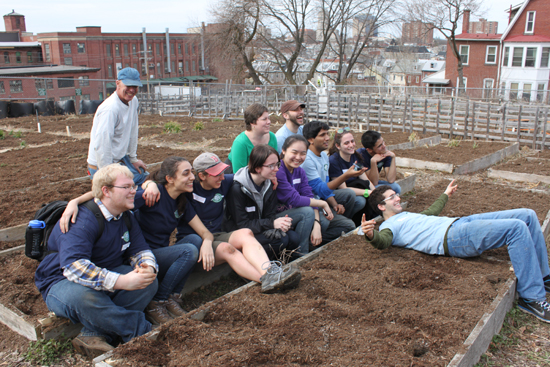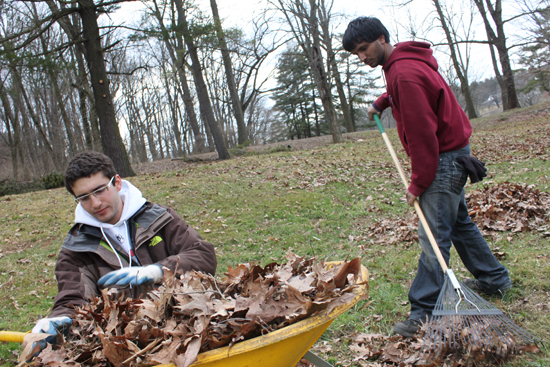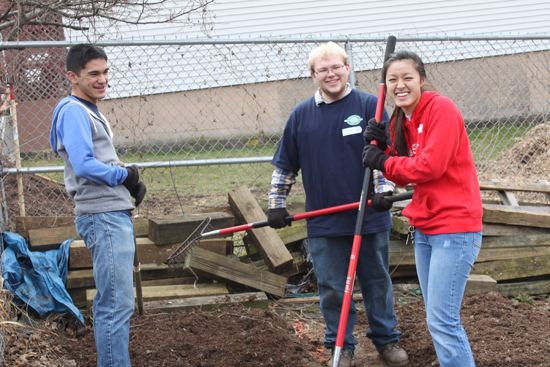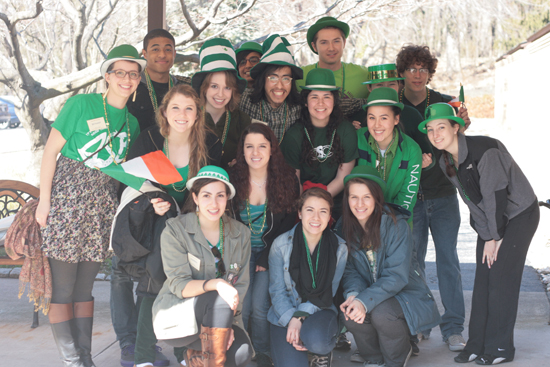Alternative Spring Breaks: Reading, Pennsylvania
Rebuilding an urban community garden

Berks County Conservancy’s Larry Lloyd (back row, from left) and Tami Shimp and chaperone Mike Lantvet; (middle row) Earl Pearson (CAS’15), Laura Kakalecz (CAS’15), Brittany Schwartz (CAS’13), Claire Simons (CAS’16), Xiaomeng Yang (CAS’15), Vidhu Nath (CAS’15), Rachel Carforo (SAR’15), and Darwin Janes (CAS’15); (front) Ahmad Zeido (CAS ’15) at South 10th Street Garden. Photo by Lauren Chudnovsky
Nearly 400 students volunteered in this year’s BU Community Service Center Alternative Spring Breaks program. ASB paired students with more than three dozen organizations around the country involved in environmental, affordable housing and homelessness, children’s services, and animal welfare efforts. This week, we are bringing you first-person accounts of some of those trips.
Just one day into our weeklong ASB work with a local land conservancy in Reading, Pa., we were in a classroom at the local church where we were staying to talk about what we were learning. The voices of 10 volunteers rang out as we shared observations on a dusty chalkboard soon filled with phrases like “healthy food access,” “helping build community cohesion,” and “strengthening bonds with nature for future generations.” As the coordinators of our ASB trip, we were awestruck at how quickly our group had absorbed lessons about teamwork, social justice, sustainability, community building, and personal growth.
We had arrived the day before, traveling 350 miles by van from Boston to assist the Berks County Conservancy, a local nonprofit devoted to protecting land and water resources in the county. The Conservancy’s work is based on the belief that access to nature is essential to maintaining quality of life, which goes right to the heart of what we were there to do. Our first—and primary—mission was to help rebuild community gardens managed by the Conservancy.
Our site contacts, Tami Shimp, vice president for development and community relations, and senior ecologist Larry Lloyd, brightened each of our days with their constant smiles and knowledge. Their spirit and dedication were infectious.

We spent much of our week overseeing restoration of a downtown community garden for Reading residents at South 10th Street. Organized into teams, we went to work. There was the cleanup team, which worked to clear the garden of clutter, and the wheelbarrow team, which dutifully shoveled 15 tons of mushroom compost, abetted by the raking team, which spread the compost over the 70 garden plots. By the end of the week, the site had been transformed, with freshly decorated plot markers, fragrant mulch from recycled Christmas trees, and a newly repaired brick sidewalk. By week’s end, each of us felt a special connection to this garden since we had had a hand in its restoration.
When we weren’t at South 10th Street, we worked at another location managed by the Conservancy, in conjunction with the city of Reading and nearby Alvernia College: the Angelica Creek Park Environmental Exploration Center. We planted trees, raked, and worked on projects to reduce erosion along stream banks. We also prepared gardens at a local public housing project for elderly and disabled residents and helped the Conservancy with office-related tasks. They asked us to share our knowledge of social media to help them reach a greater audience.
Although many of our jobs involved a great deal of sweat and dirt, our workdays remained upbeat, with lots of music, dancing, and laughter. A number of community members joined in volunteering and supplied not only extra hands, but meaningful conversations. Three of the local residents who came out to help were BU students who live in the area: Jasmin Miller (CFA’16), Kelly Hoyer (CAS’14), and Sarah Chudnovsky (CAS’14).
Almost every free moment we had was spent exploring. Excursions included a trip to Goggleworks Center for the Arts for a pottery lesson, a bus tour of an Amish community in nearby Lancaster, and a tour of the R. M. Palmer Company, famous for its seasonal chocolates, hosted by Steve Weltman, father of Alison Weltman (COM’13). We were all given sweet treats to take home at the end of the tour. Another point of interest was the Berks County Community Foundation, a LEED-platinum-certified building, which provides monetary support and a meeting space for local nonprofits.

One of the highlights of the week was a sunset trip to the top of Mount Penn to visit Reading’s famous Pagoda, a popular tourist attraction that is lit up each evening and offers breathtaking views of the city below.
Even our six-hour ride from Boston to Reading was a blast. We rode in style, having decorated our 12-passenger van with paint markers just before leaving campus. We were hosted during our stay by the community of St. James Church. We slept on cots provided by the Red Cross and were joined by students from Gordon College, who were also in Reading for a service trip. Many evenings, we played board games and icebreakers together, which led to some great bonding. We treated the lawn in front of the church as our own BU Beach and celebrated the nice weather by lying outside to enjoy the sun and warm breezes.
Our reward as we prepared to leave at week’s end was the knowledge that the urban garden plots we had worked hard to restore would continue to foster a sense of community and friendship long after we had returned to BU. Our thanks to all who donated to make this trip possible, among them the parents of volunteers who hosted us for meals, and the community of St. James Church for generously providing us with accommodations.
Laura Kakalecz can be reached at lkakalec@bu.edu. Brittany Schwartz can be reached at bschwrtz@bu.edu.
Read more Alternative Spring Breaks stories.
This Series
Also in
Alternative Spring Breaks
-
March 21, 2014
Alternative Spring Breaks: Crossville, Tennessee
-
March 20, 2014
Alternative Spring Breaks: Flagstaff, Arizona
-
March 19, 2014
Alternative Spring Breaks: Nashville, Tennessee

Comments & Discussion
Boston University moderates comments to facilitate an informed, substantive, civil conversation. Abusive, profane, self-promotional, misleading, incoherent or off-topic comments will be rejected. Moderators are staffed during regular business hours (EST) and can only accept comments written in English. Statistics or facts must include a citation or a link to the citation.